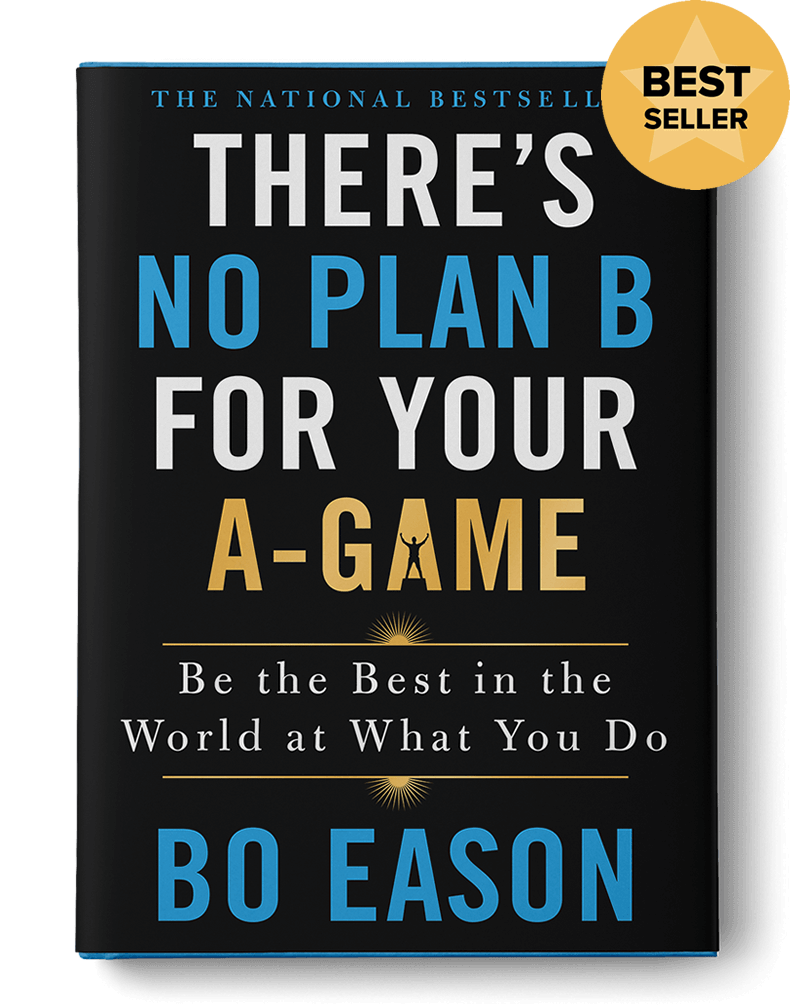Bo & Dawn Unplugged, Part 2
Dawn: When you tell everyone, “Look you’ve got to get out there and rehearse your story,” it’s a nice idea but everyone knows how hard that really is. Can you tell us how you rehearse? Are there places you rehearse? How do you carve out time to rehearse? Give us an idea of how that works.
Bo: I rehearse everywhere. I don’t have a rehearsal hall that I rent and got to and do my rehearsals. I used to. But now I rehearse 24 hours a day, like I’m backstage rehearsing and figuring things out—all the time. When I’m washing dishes …
Dawn: He does do the dishes.
Bo: When I’m doing the dishes, the kids and Dawn always go, “What did you say, Dad?” And I’m like, “Nothing.” I was rehearsing. But they think I’m talking to them. I’m always writing. I’m always rehearsing. When you come to my office, you see the walls are covered with my writings and my thoughts and my ideas. I’m getting them down on paper so that I can memorize them over months and months and months of time. And therefore when I’m stage I’ve been memorizing something for eight months, I haven’t said it on stage yet but a year passes and boom it comes out of my mouth. Because it’s been on the wall and I’ve been applying it to my molecules for so many months. I don’t want to have to think up here, I want to just give it. The only way to do that is to attach these things to your molecules, to actually make it a part of your body.
I love words and I love impact. I’ve always loved impact. I liked hitting people—making that kind of impact—and then impacting people from stage, impacting their emotions or their solar plexus. I like impact so I’m constantly thinking how can I make a better impact. What do these people need? How can I fulfill what they need? And then I decide usually what you need. I don’t wait for you to decide. I decide for you. I say you know what they need? They need to know that they’re the best. And they need to know that’s their birthright, that’s what they need to know. They need to get their mind straight about that and they need to disassociate themselves with the culture around them that says, “You’re not the best. You’re mediocre and if we choose you, you can be the superstar for one month and that’s it.” And that’s all a lie, as we all know.
Dawn: Another thing that I want people to get an idea of is when you are giving a speech and you’re backstage, and how you usually prepare for that. From my end, when I am lining up the details, getting his flights arranged, talking to the group that he’s speaking with, I always make sure there’s time for Bo to get on the stage. So I say, “When is Bo speaking? Do you have a break? Are you clearing the room? Is there an hour lunch break so that Bo can warm up on the stage? Is there a time in the morning beforehand that he can come in? We’ll go find the ballroom the night before just to see the stage setup and see the way the room is set up.
And sometimes there isn’t that luxury, you don’t have that time so there’s a quick break and even if people are still in the room, Bo is on that stage. He’s not hiding backstage like, “I’m the speaker, I have to be introduced and I can’t have anyone see me.” He’s on the stage getting comfortable, setting his notes, walking around, making sure his water is there and getting his feet for ten minutes before the introduction. We always have to remember ahead of time to check in with the event planner and make sure there’s that time for Bo because it’s really important.
Bo: And usually they’re shocked because we go, “Bo needs rehearsal time.” And they’re like, “Rehearsal?” As if it’s a bad word. If I were running the 100 meters in the Olympics, trying to win the gold medal—I’ve trained for 20 years to be there, I’m one of the fastest men in the world—do I just enter the Olympic stadium and walk right to the blocks and just start and try to win? I’m not winning shit if I do that, right? Pros have a process and a ritual and a routine that they go through. But most speakers just show up and go, “Hey, here I am. How are you doing? Good to be in Detroit.” And you’re bored from the first word out of their mouth because they’re not ready to be on stage. They’re just not brave enough to get ready. It pisses me off too. Because you know what? In the end, those amateurs cost you money. They’re in the way. Do you notice how amateurs are always in your way? They’re always in your way. They’re not willing to pay the price. They want something for nothing. They want to be chosen. “Please choose me, please choose me.” And we don’t play that way. We choose ourselves. We prepare for that day of greatness, which is on its way. All of us in this room, each one of us, there are two or three days—four, maybe, for some of us— of this year that are crucial. The rest is grunt work. The rest is preparing for that day.
Pros know those days are coming. Amateurs are blindsided when the day arrives. “I’m not ready.” Of course you’re not ready, you didn’t know the day was coming.

